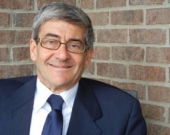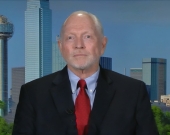Dr. Emran El-Badawi program director and associate professor of Middle Eastern Studies at the University of Houston for Gulan: My hope is that the American people can vote Trump and numerous
August 3, 2019
Exclusive Interviews

Dr. Emran El-Badawi is program director and associate professor of Middle Eastern Studies at the University of Houston. He founded the Arab Studies program at UH and he has designed, implemented and assessed degree programs in the Humanities and Sciences. These include degrees in Arab-Middle East Studies, Religious Studies and interdisciplinary studies in Energy, Development and Sustainability, with a focus on US-Middle East relations. El-Badawi has consulted for various industries, including government, law and oil & gas. He is also active in program development and fund raising. El-Badawi is also the founding executive director and treasurer of the International Qur'anic Studies Association, which is the world's first learned society of its kind. Part of IQSA’s goal is to bridge the divide between scholars in the west and those in Muslim majority countries through international conferences. El-Badawi has published in English as well as Arabic and has made dozens of national as well as international media contributins or appearances, including for The New York Times, Al-Jazeera, Forbes, Christian Science Monitor and Association Relative à la Télévision Européenne (ARTE). His awards include honorable acclaim by the British-Kuwait Friendship Society Book Prize for his book on The Qur'an and the Aramaic Gospel Traditions. His current research projects include a book on 'Arab Liberalism' between secular nationalism and political Islam, as well as a project documenting the evolution of Eastern Church/Canon Law to Shariah Law. El-Badawi has a bachelors degree in Computer Science from Rutgers University, and he received his Ph.D. with honors in Near Eastern Languages and Civilizations from the University of Chicago.Gulan: first of all, your general characterization of the current situation? with regard to all these tensions between US and Iran?
Dr. Emran El-Badawi: As I stated in a recent op-ed (https://www.houstonchronicle.com/opinion/outlook/article/Will-the-U-S-go-to-war-with-Iran-Americans-13864858.php) , Washington is looking for a war, by any means necessary. I can add to this that the US military industrial complex, including the aerospace and defense sectors completely depend on perpetual military conflict to make profit. Added to this is that president Trump has galvanized much of the American public with his populist, and many would say racist, rhetoric; and he is up for re-election in 2020. War is a proven way to ensure election support, and even victory. For now the Trump administration has worked hard to destabilize Venezuela, the Israeli-Palestinian conflict, Iranian economic interests, and other conflicts. He has also applied unprecedented economic pressure on China, Mexico and other nations to get his way. The recent political escalation between the US and Iran should be understood in this context.
Gulan: some characterize Mr. Trump's administration approach-Maximum Pressure Campaign- with regard to Iran as coercive diplomacy, and others say that it is more coercive that diplomacy? What do you make about that?
Dr. Emran El-Badawi: There is not enough data to demonstrate if Trump's strong man tactics are effective or not. The litmus test would be North Korea: Trump insulted his was into a summit meeting with leader on scaling back the North Korean nuclear weapons program in 2018. There were positive signs until recently when further summits between the two were canceled amid renewed North Korean weapons tests.
That being said I would not describe president's Trump's behavior as diplomatic. He is a crude businessman with a temper problem. He completely lacks the intellect or speech to be diplomatic. It would be more accurate to describe his behavior towards other nations, including Iran, as bullying. This is why his administration regularly pushes for economic tariffs or military conflict.
Gulan: It is obvious that the economic pressure imposed by US against Iran has created a great deal of financial troubles and turmoil in that country, so to what extent Iran will be compelled to make painful policy concession, given that these sanction has taken a heavy toll on Iran's economy?
Dr. Emran El-Badawi: Iran is in a difficult position. Its citizens have been living under economic hardship for well over a decade, as a direct result of US and EU economic sanctions. The Iran nuclear deal (JCPOA) under president Obama in 2015 offered the first glimmer of hope for Iranian citizens as (at least) European companies restarting business with Iran. The Trump administration essentially nullified the deal in 2017-2018, causing Iran to enrich uranium beyond the agreed upon level by 2019. Iranian hardliners are now attacking moderates for making a deal with the US, whom they state are untrustworthy. Unfortunately they are right. In my view, we have to see what the Iranian diplomat and architect of the JCPOA, M. J. Zarif can achieve in the coming days. Is one final act of diplomacy possible or it military conflict inevitable?
Gulan: As you know Mr. Trump is pursuing almost pure transnational approach for achieving his foreign policy objectives, but what is interesting or even surprising is that his Administration is insisting on reaching a transformational and comprehensive deal with Iran- after pulling out form the nuclear deal-? So do see any discrepancies in this regard?
Dr. Emran El-Badawi: The Trump administration reneged on the Iran nuclear deal for two reasons, (1) Right wing, often Christian, GOP hawks want war with the Islamic republic; (2) Trump wants to destroy Obama's legacy, and replace it with his own. In this regards, some have suggested he is not actually against the deal itself, but merely the fact that Obama made it. Trump wants all the glory for himself; this means canceling Obama's deal, and crafting a new Trump deal with Iran. This is entirely possible. However, it is in diametric opposition to GOP warmongers. Again, the results are hard to predict.
Gulan: what should be done or could be done in order to defuse the tension and deescalate the situation? Or these two countries are inevitably on the collision course? Especially after Iran has declared it has reduced its compliance to the commitments of the nuclear deal?
Dr. Emran El-Badawi: US National Security Adviser, John Bolton, and Secretary of State Mike Pompeo, have built their careers out of war with the Middle East. There is nothing that will deter them from pursuing war with Iran. They and other right wing GOP warmongers are the real problem. Iran will never surrender its military assets to the US (as Libya did under Ghaddafi), but if the economic situation continues to deteriorate the stability of its government will falter. This is what the Trump administration wants, in order to make for an easy conflict or victory against Iran. My hope is that the American people can vote Trump and numerous GOP congressman out of office before it is too late.
Gulan: On the other hand Mr. Trump administration has revealed some aspects of its so called Deal of the century, and obviously it is heavily and overwhelmingly relies on economic reward –so to speak-, so to what extent this approach for conflict resolution and transformation will be effective and successful?
Dr. Emran El-Badawi: There are currently no details or promises about a potential "deal of the century." It is all, for now, talk. As I have mentioned above, the conflict with Iran is being driven by at least two competing political interests--GOP warmongering and Trump's ego. If a new deal can placate the GOP's belligerence and magnify Trump's narcissism, it may have some success. But I am not hopeful about it.















